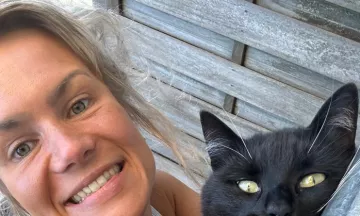Many pets are afraid of going to the vet. It can cause a lot of stress and tension for them! But, unfortunately, you can't avoid planning a regular vet visit, even if it's just for your pet's annual check-up. Also, if you are a sitter and offer home dog boarding or other pet services, it's important to know how to make a vet visit more pleasant for your guest pet. These 6 tips you make it a lot less frightening for your dog or cat to go to the vet - and maybe even fun!
1. Get used to it from an early age
It is best to let your young puppy or kitten get used to the vet from an early age. To make a visit to the vet feel safe and harmless, just drop by the vet with your furry friend for a casual introduction. That way your pet does not have to undergo treatment and simply associates the vet visit with a nice trip! Then the moment your pet really needs a vet visit, it's not so bad anymore. Read more about when to take your pet to the vet
2. Practice at home
You can practice a vet 'checkup' at home. Put your dog or cat on the table and take them through a gentle inspection of their ears, teeth etc. Stroke your pet and reward them with a nice treat so that a checkup becomes something fun to look forward to!

3. Practice with transport
Let your cat, rabbit or other small pet get used to their travel crate at home. Make sure the crate is left in a nice spot and occasionally let your pet explore it. Put a favorite blanket inside and just leave the travel crate in an accessible spot so they get used to it's presence.
In addition, it is important to get your pet used to the car (if you need to drive to the vet). Indoor cats and other animals that never go outside can experience a lot of stress from a car trip. So start off by letting your pet get used to your car with the engine off. Let your pet snoop around in their own time, and reward/reassure your pet throughout the experience. The next time, you can do the same exercise but using the travel crate and with the engine running. By the time you really have to go to the vet, the worst stress will have disappeared.
4. Be calm and relaxed yourself
Your pet is intuitive and can pick up your energy. If you are stressed, your pet will notice this and mimic behaviour. Whereas, if you have a chilled-out attitude, your pet will be much more at ease! So stay relaxed and pretend that a visit to the vet is the most normal and harmless thing in the world.
Also, it's important to realise that you are the safe 'anchor' for your pet in this uncertain environment. So put your pet at ease. Stroke your pet and speak to them reassuringly. NEVER punish, only support.
5. In the waiting room
It is best to put your cat crate in a high place, where they feel safest because they can then have a good view of the room.
If possible, place your dog on your lap and always keep it on a lead. There are often other nervous animals in the waiting room, which can cause tensions. Keep a safe distance between your pet and other waiting pets.
6. Be efficient
Try to keep the time at the vet as short as possible. Therefore, make sure that you have already provided sufficient information to the vet nurse before the appointment. This way, the vet already knows exactly why you are visiting. Remember to bring all your pet's medical information with you, such as any medication he or she uses, and a list of symptoms/observations in case you forget to mention anything. If your pet has appeared unwell at home, you can even film their symptoms on your smartphone and show this to your vet.
If your pet stays with a pet sitter
If your pet stays with a Pawshake pet sitter, for instance with a home dog boarding sitter, it's possible your pet may need a vet visit at some stage due to unforeseen circumstances. But there's no need to panic, just make sure your sitter knows what to do if that should happen. Provide your pet sitter with all the relevant information about your pet, the contact details of your pet's regular veterinarian, their travel crate and any medications they may already be taking. It's also a good idea to let your vet know your pet will be in the care of a pet sitter while you are away.




